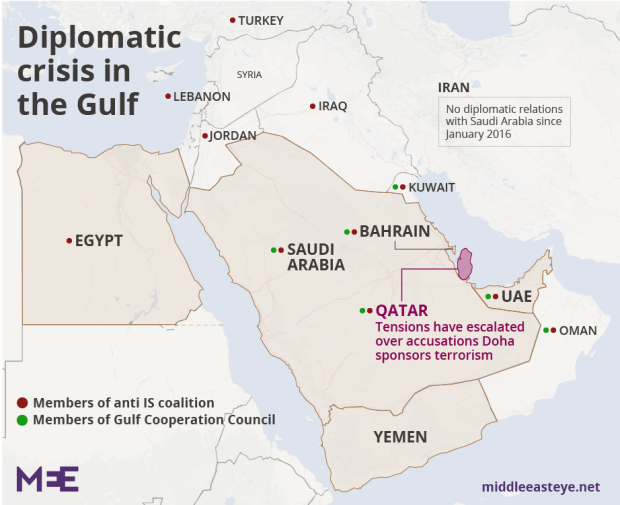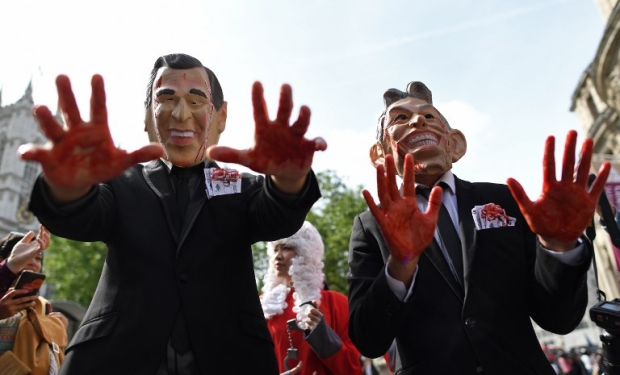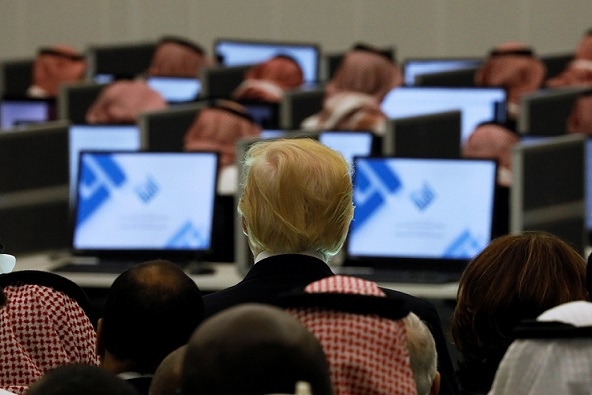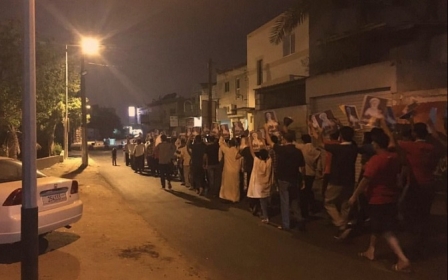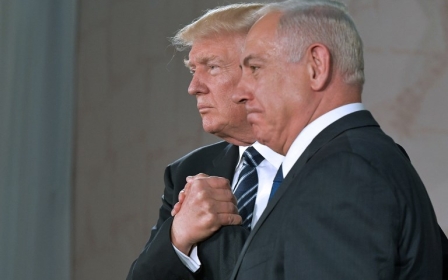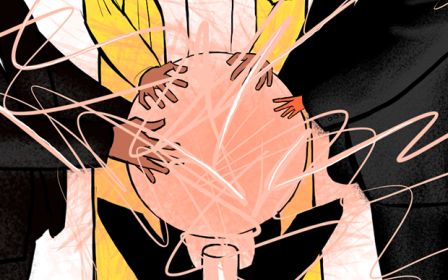The Trump effect: How the political offensive against Qatar started
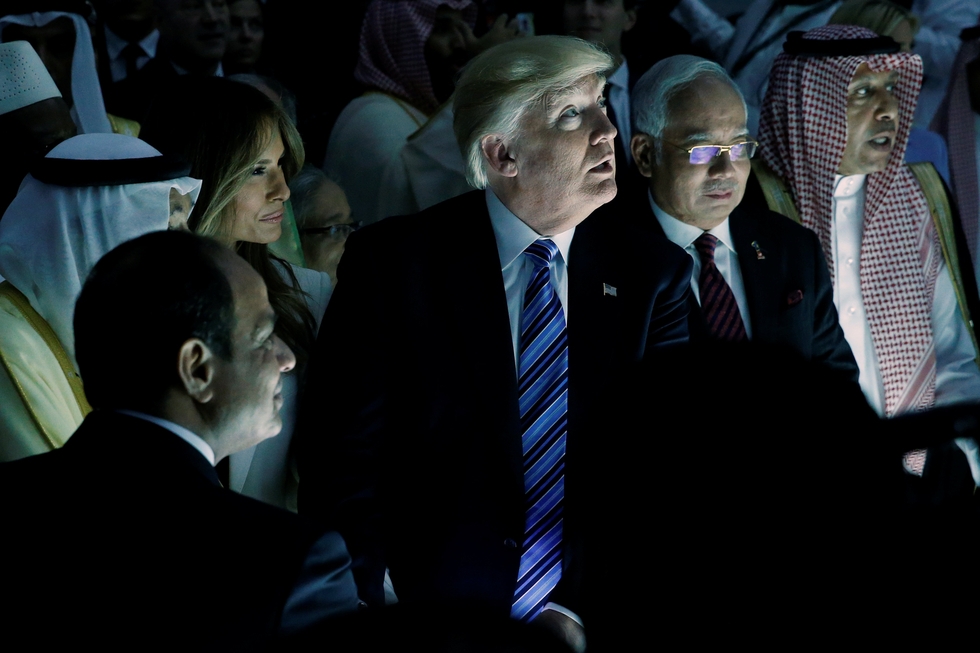
These are dark days. Darkened by the slaughter of children in Manchester. Darkened by the fawning welcome Donald Trump received in Riyadh. But darkened further by the Trump effect, which could be even more dangerous than the man himself.
Trump was crystal clear to those Arab leaders who had paid their jizya: “I am not here to talk to you about human rights. In fact, I am not going to mention the word once. I am not here to lecture you on democracy. You can do what you want to your own people. In fact, I am not here to talk to you about life at all. I am talking about death. I want you to wipe jihadis from the face of the earth,” he seemed to be saying.
This was not Cicero talking. It was Caesar. Proximity to this new source of wisdom and power was everything. At the photocall at the end of the summit, King Salman stood to the left of Trump and the Emir of Qatar to his right. The closest that Sisi could get was next to King Abdullah II of Jordan who was next to Salman.Mohammed bin Zayed, the crown prince of Abu Dhabi, turned up late. He shook hands with Sisi and then pushed himself between Trump and Qatar's Sheikh Tamim bin Hamad Al-Thani.
Bin Zayed took his duties as Trump’s right-hand man in the Middle East seriously. On Monday, the sound of someone knocking at the door in the middle of the night was heard all over Qatar.Night moves
Qataris woke to find the website of the official news agency QNA quoting the ruler of Qatar saying all the most damaging things a Gulf state ruler could say: that Doha had tensions with Trump; that he acknowledged that Iran was an Islamic power; that there was no wisdom in harbouring hostility to Iran; that Trump was facing legal issues at home.
The media coverage given to the fake news report was so swift and so complete, it could only have been pre-planned
This was crude fake news, planted by hackers. Firstly, the emir never even gave a speech to a graduation ceremony for new army recruits, the source of the alleged remarks. Secondly, no Arab leader in his right mind would publicly acknowledge at an official ceremony that he had close links to Israel.
Fake news or not, the Saudi and Emirati-controlled media went to town. Saudi-owned Al Arabiya, Al Ekhbariya and the Emirati-co owned Sky News Arabia cancelled their schedules and gave the fake news piece wall-to-wall coverage throughout the night. The media coverage given to the fake news report was so swift and so complete, it could only have been pre-planned. It took some hours for the dozy Qataris to react with a denial, but even then this was ignored or not carried until the morning.
The offensive against Qatar continued on Wednesday. Al Arabiya published “proof” that the emir’s speech was not hacked. The article however did not address the fact that the news ticker shown on the screen had been manipulated. The UAE's foreign ministry announced it was banning all Qatari news websites.
The hacking was a professional operation. And it had the intended effect. When they did realise what was going on, the shock rippled throughout the small kingdom. No one slept. They thought a coup was being planned.
Trump's green light
The finger for this points to one of Qatar’s several hostile neighbours, but to the Emirates in particular, which has both the motive and the capability of pulling a stunt like this.
If Trump wanted a short answer to the question of who is responsible for the rise of al-Qaeda and IS, the answer was sitting collectively straight in front of him
In August last year, an Italian security expert, Simone Margaritelli, a researcher with the US cybersecurity firm Zimperium, claimed that an Emirati-sponsored firm tried to recruit him to build an elite task force of hackers. Previously, the New York Times had reported how the UAE was buying off-the-shelf surveillance products. Now, the allegation went, the Emiratis were trying to develop their own team of hackers to develop their own malware and spyware.
This, of course, is exactly what happens when a Middle East neophyte like Trump gives the green light to an audience which includes most of the Arab leaders whose tyrannies and misrule are responsible for creating al-Qaeda and the Islamic State (IS) group in the first place.
This is not in any way to diminish the responsibility of Western governments in feeding the food chain of violence. British intelligence had no problems encouraging British-born Muslims to fight in Bosnia, Libya and Syria - initially - when the bogeymen were the Serbs, Gaddafi and Assad. When, however, national policy flips - as it did with Syria after 2012 - these returning yeomen are treated very differently.
Their sole concern is the preservation of autocracies of a viciousness that makes the regimes of Mubarak and Ben Ali pale in comparison. Al-Qaeda was on its knees when popular revolutions toppled these two dictators and when free elections were held for the first time in Egypt and Tunisia. The arrival of IS dates almost exactly with the military coup in Egypt in June 2013. If Trump wanted a short answer to the question of who is responsible for the rise of al-Qaeda and IS, the answer was sitting collectively straight in front of him.
This makes the Trump effect in the Middle East even more hazardous than the one Barack Obama had when he tried and failed to withdraw from it.
Free fall
Obama had many faults. He proved to be in many ways a crueller US president for the Arab people than Trump is by promising more than he could hope to deliver. Trump neither promises nor delivers.
However, the comparison between Obama’s equivalent “reset” speech that he made in Cairo in June 2009 and the tawdry laundry list recited in Riyadh is instructive.
Its not just that there is no end in sight to 15 years of the War on Terror. It is that every time you think you have reached the bottom of this downward spiral, you find there is further to fall
Obama addressed Arab people, students at Cairo University, in a venue that spelled learning. Trump addressed Arab leaders in a hall that spelled power. Obama talked about civilisation’s debt to Islam. Trump treats the Middle East like a souk, or as he put it, a global centre of opportunity - one he himself had just grabbed with both hands by bagging hundreds of billions of dollars of arms contracts.
Obama acknowledged the responsibility on him for clearing up the mess caused by the US invasion of Iraq. Trump never even mentioned it. Obama talked of human rights. Trump did not mention the words once. Obama talked of life. Trump talked of death. He said the only way to deal with the jihadis was to wipe them from the face of the earth.
The conditions which generated the popular uprising of 2011 are stronger now than they ever were. The repression is stronger, states are failing all over the Middle East to provide protection and basic services to their people. The brake has been released on killing machines around the world. The US-led coalition air strikes killed nearly twice the number of civilians in Syria than IS militants did.
You would think by now that anyone with an ounce of grey matter between his ears would pause before engaging again in another intervention. But that is indubitably where we appear to be headed. On whom the collective death wish will settle is any one’s guess. It could be southern Lebanon, yet again. But the smell of yet another intervention is unmistakable. The consequences of it on future generations of innocent civilians are unmistakable too.
- David Hearst is editor-in-chief of Middle East Eye. He was chief foreign leader writer of The Guardian, former Associate Foreign Editor, European Editor, Moscow Bureau Chief, European Correspondent, and Ireland Correspondent. He joined The Guardian from The Scotsman, where he was education correspondent.
The views expressed in this article belong to the author and do not necessarily reflect the editorial policy of Middle East Eye.
Photo: US President Donald Trump and other leaders react to a wall of computer screens coming online as they tour the Global Center for Combatting Extremist Ideology in Riyadh, Saudi Arabia on 21 May 2017 (Reuters)
This article is available in French on Middle East Eye French edition.
New MEE newsletter: Jerusalem Dispatch
Sign up to get the latest insights and analysis on Israel-Palestine, alongside Turkey Unpacked and other MEE newsletters
Middle East Eye delivers independent and unrivalled coverage and analysis of the Middle East, North Africa and beyond. To learn more about republishing this content and the associated fees, please fill out this form. More about MEE can be found here.



